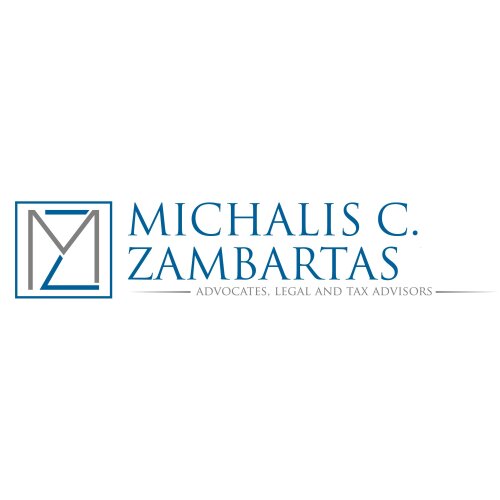Best Fintech Lawyers in Cyprus
Share your needs with us, get contacted by law firms.
Free. Takes 2 min.
Or refine your search by selecting a city:
List of the best lawyers in Cyprus

Michalis C. Zambartas - Advocates, Legal & Tax Advisors
30 minutes Free ConsultationAbout Fintech Law in Cyprus
Fintech, or financial technology, is a rapidly developing field in Cyprus, driven by advancements in technology and a favorable regulatory environment. Cyprus is emerging as a strategic location for fintech companies due to its EU membership, attractive tax regime, and well-established business infrastructure. The Cyprus Securities and Exchange Commission (CySEC) plays a crucial role in regulating fintech activities, ensuring they are aligned with both local and European Union standards. The country's dynamic approach to regulation, coupled with a flexible licensing regime, makes it an appealing destination for fintech businesses looking to expand in Europe.
Why You May Need a Lawyer
Navigating the fintech landscape in Cyprus may require legal expertise for several reasons:
- Regulatory Compliance: Ensuring compliance with CySEC and EU regulations can be complex; a lawyer can help navigate these requirements.
- Licensing: Obtaining the necessary licenses to operate legally, such as for offering e-money services or investment advice, often requires legal assistance.
- Data Protection: Fintech operations must comply with GDPR and other data protection laws, where legal guidance is crucial.
- Contractual Agreements: Drafting and reviewing agreements with partners, clients, and service providers to mitigate risks.
- Intellectual Property: Protecting technological innovations and proprietary software from infringement.
Local Laws Overview
Several key legal aspects are particularly relevant to fintech in Cyprus:
- Regulation by CySEC: The CySEC is the main body regulating fintech activities in Cyprus, providing frameworks for entities involved in electronic money services, crowdfunding, and blockchain technology.
- GDPR Compliance: Protecting personal data as per the General Data Protection Regulation is mandatory for fintech companies, impacting how data is collected, stored, and processed.
- Financial Services Laws: Laws pertaining to investment services, electronic money institutions, and payment services are critical for operational compliance.
- Anti-Money Laundering (AML) Regulations: Fintech companies must implement robust AML policies and strategies to prevent financial crimes.
Frequently Asked Questions
What is the role of CySEC in regulating fintech companies in Cyprus?
The Cyprus Securities and Exchange Commission (CySEC) oversees the regulation of fintech companies, ensuring compliance with local and EU laws, particularly for those offering investment services or electronic money.
Do fintech companies in Cyprus need a specific license to operate?
Yes, most fintech companies require specific licenses, such as electronic money licenses or payment institution licenses, depending on the services they provide.
How does GDPR affect fintech companies in Cyprus?
GDPR mandates stringent data protection measures, requiring fintech companies to secure user data and comply with data privacy laws, affecting how they collect and manage personal information.
Are there tax incentives for fintech companies in Cyprus?
Cyprus offers an attractive corporate tax rate of 12.5%, alongside other tax incentives aimed at fostering business growth and innovation in the fintech sector.
What steps should a start-up take to ensure compliance with local laws?
Start-ups should consult with legal professionals to understand licensing requirements, comply with regulatory standards, establish AML policies, and ensure GDPR compliance.
How can a lawyer assist with protecting intellectual property in fintech?
A lawyer can help protect technological innovations by advising on patents, trademarks, and copyrights, ensuring legal safeguards against infringement.
What are the consequences of non-compliance with CySEC regulations?
Non-compliance can result in severe penalties, including fines, license revocation, and criminal charges, making legal compliance paramount for fintech companies.
How do fintech companies in Cyprus handle international transactions?
These companies follow EU regulatory frameworks, ensuring cross-border payment services comply with relevant laws and standards.
What is the process for obtaining an electronic money license in Cyprus?
The process involves submitting an application to CySEC with required documentation, detailing business operations, risk management procedures, and financial projections.
Are there specific legal issues related to blockchain and cryptocurrency in Cyprus?
Yes, while blockchain offers innovation, legal challenges include regulatory compliance, AML obligations, and ensuring the legality of cryptocurrency offerings and transactions.
Additional Resources
Individuals seeking more information on fintech in Cyprus can explore the following resources:
- Cyprus Securities and Exchange Commission (CySEC): Offers guidelines and updates on regulatory requirements.
- The Central Bank of Cyprus: Provides information on financial services regulations and licenses.
- Cyprus Fintech Association: Offers networking opportunities and resources tailored for fintech professionals.
- European Securities and Markets Authority (ESMA): Provides EU-wide regulatory updates that affect Cyprus.
Next Steps
If you need legal assistance in fintech, consider the following steps:
- Research Reputable Law Firms: Look for firms specializing in fintech law with a strong track record in Cyprus.
- Schedule Consultations: Engage in initial discussions to understand how they can help you navigate legal complexities.
- Prepare Documentation: Organize all necessary business and financial documents to facilitate smoother legal evaluation and advice.
- Stay Informed: Keep abreast of regulatory changes and updates that may affect your business operations in Cyprus.
Lawzana helps you find the best lawyers and law firms in Cyprus through a curated and pre-screened list of qualified legal professionals. Our platform offers rankings and detailed profiles of attorneys and law firms, allowing you to compare based on practice areas, including Fintech, experience, and client feedback.
Each profile includes a description of the firm's areas of practice, client reviews, team members and partners, year of establishment, spoken languages, office locations, contact information, social media presence, and any published articles or resources. Most firms on our platform speak English and are experienced in both local and international legal matters.
Get a quote from top-rated law firms in Cyprus — quickly, securely, and without unnecessary hassle.
Disclaimer:
The information provided on this page is for general informational purposes only and does not constitute legal advice. While we strive to ensure the accuracy and relevance of the content, legal information may change over time, and interpretations of the law can vary. You should always consult with a qualified legal professional for advice specific to your situation.
We disclaim all liability for actions taken or not taken based on the content of this page. If you believe any information is incorrect or outdated, please contact us, and we will review and update it where appropriate.
Browse fintech law firms by city in Cyprus
Refine your search by selecting a city.













